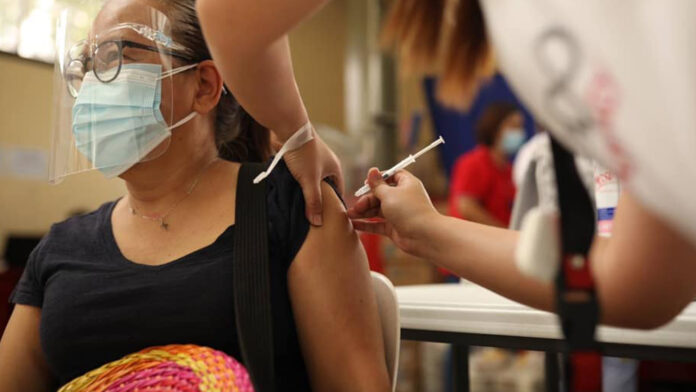A lawmaker at the House of Representatives on Thursday stressed the need to enact a general law protecting all vaccinated individuals against those who will refuse to receive the coronavirus disease 2019 (Covid-19) vaccines pursuant to the general welfare clause of the 1987 Constitution.
Cavite Rep. Elpidio Barzaga Jr. cited the general welfare clause stating that “the State is mandated to make rules and regulations to protect the lives of the majority of its citizens”, arguing that a person who is not vaccinated is “a risk to the lives of others and to the general community”.
“The State can therefore enact a general law protecting those who are vaccinated from those who are not vaccinated. While others might argue that such law shall be discriminatory – discriminating those vaccinated against those non-vaccinated. Nonetheless, there shall be no violation of the constitutional rights to due process and equal protection clause,” Barzaga said.
He cited a survey of the University of the Philippines-OCTA research team last February showing that only 19 percent are willing to be vaccinated, 46 percent are unwilling and 35 percent are undecided.
Barzaga said that while the number of those who want to be vaccinated is increasing, the number will not be enough to protect the population for as long as there are people who will continue to refuse inoculation.
He explained that while the Constitution guarantees the right to life of every individual, “such right is subservient to the paramount interest of the lives of the greater majority”.
Article II, Section 5 of the Constitution (Declaration of Principles and State Policies) states: “The maintenance of peace and order, the protection of life, liberty, and property, and the promotion of the general welfare are essential for the enjoyment by all the people of the blessings of democracy.”
Barzaga said that under the general welfare clause, it would be legal and constitutionally accepted for an employer to issue a policy that only vaccinated applicants can be employed.
He said malls can impose a regulation that only those vaccinated shall be permitted to enter while restaurants and hotels can accept only persons who have been vaccinated.
He further noted that private parks can refuse entrance to those who are not vaccinated and even schools can impose a restriction that its enrollees must be fully vaccinated as a condition for enrollment.
“Even the right to travel shall be restricted,” said Barzaga. “Covid-19 is real and it has come closer to home. It has touched all of us, where every one of us has a parent, sibling, relative, friend, co-worker who has been infected by this deadly virus.”
Barzaga said the State has no option but to protect those who are vaccinated, highlighting that the average direct medical cost is at least PHP400,00.00 for a four-day stay in the hospital by a patient suffering mild Covid-19.
“Unfortunately, this financial cost is nowhere near the total harm caused by the pandemic. A great number of us are fearful of getting infected… Social distancing, masking, basic COVID-19 protocols work but vaccination is an important key to stop this pandemic,” he said.
Allow private sector to roll out vax program
Meanwhile, Valenzuela Rep. Wes Gatchalian urged the national government to give the private sector the leeway and flexibility to roll out their Covid-19 vaccination programs without classification of their employees.
Gatchalian reiterated that although the vaccines were procured by the private sector using their own funds with the facility of the government through a tripartite agreement, this private sector initiative would “redound to the benefit” of the Department of Health (DOH) as it would now be unburdened from the cost of having to vaccinate the millions of private sector workers.
The rollout, he stressed, should be given to all its employees, fairly and without distinction or classification.
“The vaccine rollout, in accordance with the law and the IRR, should be a collaborative effort between the national government, the LGUs (local government units), and the private sector in order to expedite the inoculation of as many Filipinos as we can,” Gatchalian said.
He said if the rollout can be achieved with ease and the least number of requirements, the Philippines may be able to attain its target of achieving herd immunity, which in turn would help save lives, afford relief to the health sector, and provide the confidence to open businesses to revive the economy.
“The guidelines that the private sector must follow in the conduct of the vaccination program should be clear and allow them the leeway and flexibility to inoculate their employees after the priorities set by the law,” he said.
Photo Source: Facebook/Quezon City Government


